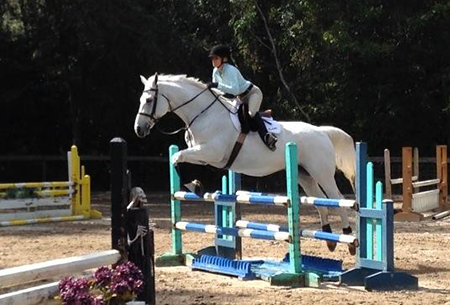
Wyatt, a 15-year-old warmblood, excelled in his professional show career and his personality made him many friends. His owner, Alice Dunn, and trainer, Katie Young, enjoyed working with Wyatt and knew he was a special horse. This is why Dunn never had a problem treating the mild cases of colic Wyatt occasionally experienced.
“He had a few cases of mild colic that occurred at horse shows while he was showing in the Adult Hunters and First and Second Year Green Hunters,” Dunn said. “Our primary care veterinarian, Dr. Peggy Fuller, referred us to the UF Large Animal Hospital because of the bouts with colic, where we found out that he had ulcers.”
UF veterinarians treated Wyatt with medication to decrease acid secretion and allow ulcer healing. However, following a 30-day recheck examination that showed his ulcers had healed well, Wyatt suffered his first major colic. The colic involved an obstruction caused by the large colon becoming displaced and hooked over the nephrosplenic ligament. This condition, known as nephrosplenic entrapment, meant emergency treatment was needed. When Wyatt didn’t respond to non-surgical therapies, Wyatt was taken in for emergency colic surgery.
Dr. Alison Morton of the UF Large Animal Surgery Service performed the surgery, repositioning the displaced colon to its normal position. Wyatt recovered from this procedure but shortly thereafter, while still hospitalized, he suffered another colic episode, this time involving his small intestine. Dr. David Freeman, large animal surgery service chief, performed this procedure and successfully corrected the problem. Following, Wyatt recovered well from both operations, Dunn was informed of the post-surgical home care requirements, and Wyatt returned home a week later.

As the next several months passed, Wyatt had several episodes of colic, including additional episodes of colonic displacement, including nephrosplenic entrapment. These episodes were treated successfully by Dr. Fuller and at UF for short periods of time. Dunn and Young worked with Dr. Fuller and the veterinarians at UF to formulate a diet that helped reduced Wyatt’s colic issues. Wyatt’s caretakers also noted that his problems worsened in certain types of weather, so they managed his diet and revised his care during these times. Still, Wyatt was not out of the woods.
“It was very close to one year from his last surgery when Wyatt suffered another nephrosplenic entrapment,” Young said. “It was resolved medically at UF, and that was when Drs. Morton and Freeman recommended an elective procedure that was less invasive.”
The recommended procedure was a laparoscopic-assisted nephrosplenic space closure and involved suturing closed the space between Wyatt’s left kidney and spleen to prevent potential future entrapment of his large colon. Drs. Morton and Freeman felt that Wyatt was an excellent candidate.
“When Wyatt was re-presented with another nephrosplenic entrapment, we recommended the procedure because of Wyatt’s history of frequent displacements of his large colon, and Alice’s and Katie’s continuous support of him,” Dr. Morton said. “This procedure would not prevent Wyatt’s colon from becoming displaced in the abdomen, but would prevent it from getting ‘stuck’ in the nephrosplenic space which often requires emergency colic surgery for correction.”
With this procedure, Wyatt’s intermittent bouts of colic would be more likely treated successfully with routine medical therapies, and hopefully milder and less frequent. The surgery went well, but Alice and Katie were not convinced there wouldn’t be more colic episodes.
When Wyatt was sent home to Coriander Farms, video cameras were installed in his stall so he could be observed remotely 24/7, and all of their barn staff was carefully schooled in what to watch for.
“The three main clinical signs that are consistent with Wyatt’s colic episodes are flipping his lip, decrease in appetite, and an overall mopey look and feel,” Dunn said. “He is also sensitive to weather change so we have a special diet for him developed after years of experimenting that helps him stay hydrated.”
Since the preventative surgery in 2007, Wyatt has not required additional surgical procedures, and his frequency and intensity of colic episodes has dramatically decreased. The veterinary specialists at UF, along with their support staff and 24-hour care, enabled Wyatt to return to the show ring and enjoy a more colic-free life. He still lives with careful managements from his caretakers, and if Wyatt begins to show any potential signs of colic, Dr. Fuller is on her way to evaluate, and UF is just a phone call away if Wyatt were to need additional care.
“I think Wyatt will be around for a very long time,” Young said. “While he is prone to colonic displacements, our continuous care keeps the colic episodes at bay.”
View all UF Large Animal Hospital Success Stories.




